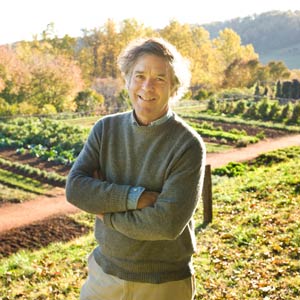FOR IMMEDIATE RELEASE - Monday, May 2, 2011
Media Contact: Lisa Stites, 434-984-7529
 CHARLOTTESVILLE, VA.— Monticello’s Director of Gardens and Grounds, Peter Hatch, often quotes Jefferson’s Memorandum of Services to My Country (September 2, 1800), “The greatest service which can be rendered any country is to add an useful plant to it's [SIC] culture.”
CHARLOTTESVILLE, VA.— Monticello’s Director of Gardens and Grounds, Peter Hatch, often quotes Jefferson’s Memorandum of Services to My Country (September 2, 1800), “The greatest service which can be rendered any country is to add an useful plant to it's [SIC] culture.”
A scholar and gardener, Hatch has dedicated his life’s work to restoring Thomas Jefferson’s revolutionary garden at Monticello. His significant contributions to historic preservation and gardening are now being recognized by the Garden Club of America.
On April 30, 2011, Hatch was awarded the Garden Club of America Historic Preservation medal at the club’s annual Medal Awards Dinner, held in Indianapolis, Indiana.
“I’m flabbergasted by the honor; it’s positively transcendent. Reading over the list of past honorees, I believe I might be the first professional gardener to receive the medal. So I accept on behalf of all those who toil in the earth, my fellow brothers and sisters of the spade. Of all the things I do at Monticello – write books, run summer Institutes – gardening is the hardest – and the most rewarding thing I do,” said Hatch.
The medal is awarded for outstanding work in the field of preservation and/or restoration of historic gardens or buildings of national importance.
Hatch’s noteworthy career at Monticello started 34 years ago. He was responsible for the restoration of the 1,000-foot–long terraced Vegetable Garden, where Jefferson assembled plants and vegetables from all over the world. Today the garden is a beautiful interpretation of Jefferson’s “scientific laboratory.”
Describing his tenure at Monticello, Hatch says, “I’ve learned the twin virtues of gardening: persistence and patience. Despite my lengthy tenure, however, I have not found out who Thomas Jefferson is. Surely, he’s all things to all people; digging a hole to find him, you dig forever. His unbounding complexity makes him a compelling force in both American and world history. And that’s my favorite thing: digging in the earth, digging for the past.”
Hatch’s contribution to historic preservation has shaped the gardens of Monticello. As a lecturer and author he has created a passionate discourse for those interested in learning more about gardening, landscape architecture, cooking and American history.
Considered one of the foremost scholars on Jefferson and gardening, Hatch is the author of The Gardens of Monticello and editor of “Thomas Jefferson’s Flower Garden at Monticello” (University Press of Virginia). Hatch’s new book Thomas Jefferson’s Revolutionary Garden, explores Jefferson’s collection of plant varities—330 varieties of eighty-nine species of vegetables and herbs—in his garden. Thomas Jefferson’s Revolutionary Garden will be published by Yale University Press in spring 2012.
Hatch has also written numerous articles and lectured in 35 states on Jefferson and gardening. He also oversees educational programs, including the Garden Tours (for 35,000 annual visitors); the Saturdays in the Garden program of natural history walks, lectures, and horticultural workshops; and the Historic Landscape Institute, a two-week field school for students from around the nation.
The Garden Club of America Historic Preservation Medal was designed in 1973 by sculptor Joseph Kiselewski of New York City. The medal was presented and endowed by Mrs. John Leddy-Jones, Founders Garden Club of Dallas (Texas), and Mrs. Leonard Kirby, Jupiter Island (Florida) Garden Club.
Previous recipients of the Historic Preservation Medal include Gordon Gray, former Chairman of the National Trust for Historic Preservation (1974), philanthropist Lila Acheson Wallace (1977), and the Mount Vernon Ladies Association (2010).
###
The Thomas Jefferson Foundation owns and operates Monticello, the mountaintop home of Thomas Jefferson. As a private, nonprofit organization, the Foundation receives no regular federal or state budget support for its twofold mission of preservation and education. About 450,000 people visit Monticello each year. For information, visit www.monticello.org.